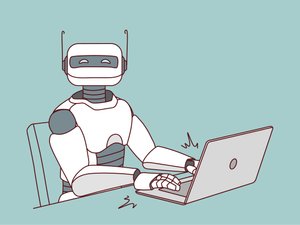Artificial intelligence has the potential to transform businesses, and that evolution is already underway for some Chicago startups.
Local tech companies are starting to use generative AI — a system such as ChatGPT that can create text from a question or prompt — to enhance customer service, help manage complex systems and automate some job roles, while grappling with its effects on their workforces.
Chicago logistics startup Project44, for example, said it is training generative AI models to become experts in supply chain. The company recently launched Movement GPT, which Adam Compain, senior vice president and global head of product marketing for Project44, described as the company's own generative AI capability built within its supply chain platform.
The new tool helps customers use conversational language within Project44's Movement platform to answer questions and resolve issues that they're dealing with every day.
They might use the platform to identify shipments and to get a better understanding of their value and where they are heading. It can also help identify supply chain risks and inform users of more reliable routing options for their next shipment.
Compain told Chicago Inno that the company has been assessing generative AI solutions as they've become more available and that Project44's platform now leverages AI to not only aggregate data but provide the real-time insights that people working in the supply chain need to make decisions.
"I think it's going to continue evolving and change the industry. It's going to keep increasing the agility that supply chains need," Compain said. "We view this no different than the advent of the personal computer, the smartphone and machine-learning models that have been helping supply chains for some time."
Project44 is hardly the only local startup that has looked into adding AI.
Provi, an online beverage marketplace startup that aims to make ordering wholesale alcohol easier by connecting buyers, distributors and suppliers, has started using machine learning to revamp its customer search and recommendations capabilities. The company expects to roll out the feature nationally by June.
"We use machine learning for search, and we're starting to dabble in terms of what can we do with AI," David Herman, chief product officer with Provi, told Chicago Inno. "There's a lot of other companies like the Amazons of the world who are starting to invest in building platform capabilities that make it easier for companies like us as a startup to be able to leverage it without having to make a huge upfront investment."
He also envisions Provi using AI to help inform data discrepancies and ensure accuracy of orders.
Even the Chicago Blackhawks are getting into the mix by investing in a Charlottesville, Virginia-based company that is using AI to change the way injuries can be assessed and treated.
While VC funding has cooled down from a record-setting 2021, AI startups have been an exception: Three of the top 10 deals across the U.S. venture ecosystem in the first quarter went to AI developers, with a focus on generative AI, according to CBInsights.
The global generative AI market is expected reach $43 billion in 2023 and $98 billion by 2026, estimates PitchBook.
'Leveling the playing field'
One worry about AI is that it will eliminate jobs. Roughly two-thirds of current jobs are exposed to some degree of AI automation and up to one-fourth of current work — the equivalent of 300 million full-time jobs worldwide — could be candidates for substitution, according to a Goldman Sachs report. The report estimates that 18% of work globally could be automated.
"If you look at history of really advanced technology, sure it has displaced some tasks," Project44's Compain said. "But by and large, we believe it's up-leveled the workforce and allowed them to spend more time on things people are good at — like using reason, interacting with customers and partners, and making strategic decisions — and alleviates them from doing things like playing around with spreadsheets all day."
Herman said he thinks generative AI will add jobs at Provi to help develop and incorporate the technology and may help even the playing field for smaller startups.
"As more of these bigger companies start to use it, I think it will make it less of a burden [for companies like us] to get onboard," Herman said. "We're excited for what Microsoft has done and for Amazon is about to do with AWS just to make it easier for us to dip our toes and see what we can get out of it."
Ivy Walker, founder of AskCoda, a company that provides an AI-powered COO for small businesses to make running a business easier for entrepreneurs, said she thinks AI will bring a lot to the table for small business owners.
"I'm really excited by what AI can bring to small business owners like myself who have historically lacked access to resources," she said during a virtual event hosted by Chicago Innovation last month that discussed the future of AI. "This is an affordable technology that can really make our lives easier by helping us to turn those routinized things that we have to do into automation so that we can push these things off our plate."
Likewise, Coro, an international AI-based cybersecurity company with big plans for Chicago, recently landed $75 million in funding that brings its valuation to $575 million, according to TechCrunch.
The company's co-founder Dror Liwer said the emerging technology will only help small businesses by eliminating the need for them to hire cybersecurity staff, thereby enabling them to focus on more meaningful tasks and not menial ones.
He sees AI as "leveling the playing field" because a 200-person trucking company out of Wisconsin can have the same level of protection that a major bank has.
"Whether it's accounting or legal, a lot of other areas that are using the underlying technology are going to ... allow the mid-market and small businesses to be able to participate in the economy more effectively," he told Chicago Inno. "Why should a human do repetitive, menial work when a machine can do it in a fraction of the time?"






